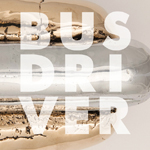|
|
 |
Dusted Reviews
Artist: Busdriver Album: Jhelli Beam Label: Anti- Review date: Aug. 12, 2009 |

|
|
|
 |
The expression “spit a rhyme” may as well have been coined for Busdriver, who seethes more contempt per square pentameter than any other rapper I know of. Unlike, say, Chuck D or El-P, who keep it pretty targeted, or Eminem, who’s playacting at least some of the time, Busdriver holds in pitifully low esteem not just the usual scapegoats (politicians, personal and institutional racism, wack rappers) but also himself, and you, and the general enterprise of trying to make a living by entertaining other people. He’s not that direct about it – one’s never quite sure just where his fight is – but for an artist whose technical skill is basically irreproachable, he sure seems to despise what he does.
It might be fair to say he always has, in which case the most logical explanation for his estimable career is that he’s really, really good at hating on his chosen medium. But he’s also been better at making his high-concept scorn palatable than he is on Jhelli Beam, a tirelessly – and voluntarily – unpleasant din of an album. There is plenty that could have been smooth and enjoyable and no less impressive for it, but that’s not Bus’s game. Take his pacing: it only occasionally deigns to hit the right tempo; mostly it’s either just a bit too fast to understand without the CD booklet’s accurate-ish lyric transcriptions or slowed down to a constipated, mock-operatic squeal (which definitely doesn’t make him come across any less like the backpack-rap version of Craig Finn). Leaving aside what he’s saying, his rhymes have never sounded uglier, and, with the exception of Omid’s slithery “Unsafe Sextet,” a whole rotary of Mush producers is at a loss to make music for them or from them.
But verbal agility isn’t the only thing dulled by Jhelli Beam’s anti-charm offensive. Heavy-handed lyrical irony is hard at work from the album’s opening words (“Be real: conscious rap failed us”) to its last, inverting rap’s whole system of signification to something resembling stand-up comedy that’s too harsh to be funny – the affecting parts sound disdainful, the self-effacing parts kind of despicable. Bus does the dysfunctional sex boast with all the sweaty charm of a Philip Roth narrator (cf. “Happy Insider” and “Fishy Face”), but even his quotable disses would fall flat without a long-term commitment to sarcasm (“Oh your game’s so tough it demagnetized my keycard / You’re so hot and fresh your merch booth needs a sneeze guard”). And the 80 percent of the album devoted to rapid-fire, free-associative zeitgeist-baiting barely rises above its own density. “The heir apparent of the feral lads in American Apparel ads rises from the glow of the backlit keys / The HTML-formatted speak-and-spell door magnet looks futuristic and Japanese / But my onomatopoetic Somalian surname makes me look four-legged like I got fur, fangs, and a diamond gun butt in my mud hut.” What?
Dig a little into that latter rant, though, and you get some idea of the bigger picture. Busdriver is, in the mold of authors like Paul Beatty and Colson Whitehead, a smart black man who knows he’ll probably never be just a smart man, and who, well into his career, still can’t fully buy into the pedestal he’s standing on. Jhelli Beam doesn’t lack wit or inventiveness or honesty, or any of the other things that are good about “conscious rap,” but it implicitly disowns them all as impotent or corrupt, as failures before the fact. Its self-loathing is too self-aware, too pervasive, to accomplish anything more productive than wallowing. “Oh shit, I’ve been waiting for you to reduce the black experience to a series of fly-by-night catch phrasing,” goes the opening salvo to “I’ve Always Known.” Later, “Come on now, no one thinks that real niggas love rapping nerdy.”
And these, for what it’s worth, are the album’s gems of purpose and clarity. So what’s it worth? Busdriver is no less preoccupied with the thin line between artistry and minstrelsy than he was when he named an album Fear of a Black Tangent, but he’s become more and more certain that he can’t talk about that line, angrily or humorously, without blurring it himself. That’s a hell of a corner to find yourself painted into. His way out on Jhelli Beam is to keep painting, thicker and darker and wetter than ever, honing skills he suspects are beneath him, excelling in a medium he doesn’t trust, insisting authenticity is bunk until you know he’s for real.
By Daniel Levin Becker
|







